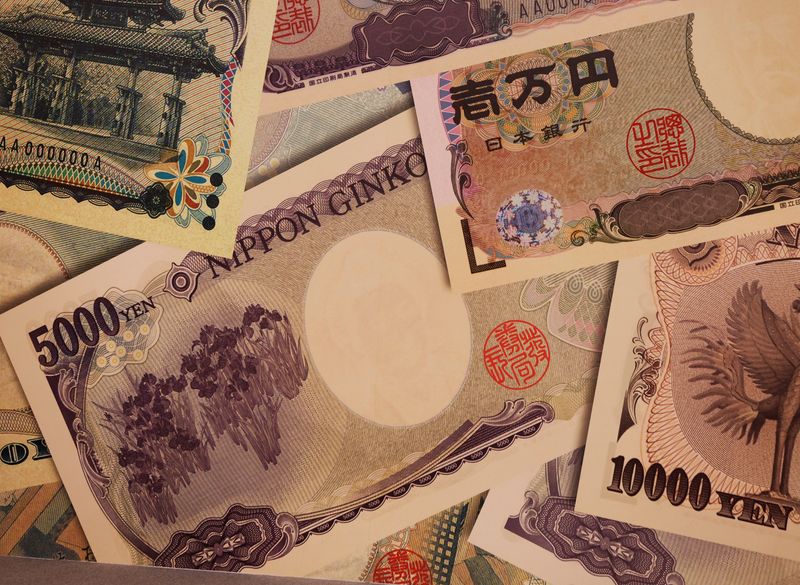By Nell Mackenzie
LONDON (Reuters) - Pressure on Japan to prop up a weak yen may have ebbed, but currency weakness remains a headache for Tokyo.
The yen is down 9.4% against the dollar so far this year, and looks set for a fourth year of declines. That's created a two-speed economy, with exports and tourism benefiting from a more competitive exchange rate while households and small businesses are squeezed by rising import prices.
Four investment managers shared four ideas on how to trade yen weakness. Their views do not represent recommendations or trading positions, which they cannot reveal for regulatory reasons.
1/ FLORIN COURT CAPITAL
* Diversified systematic asset manager
* Size: $2 billion assets under management (AUM)
* Founded in 2016
* Key trade: Short-Asia currencies ex-Japan
Florin Court CIO Doug Greenig says that instead of playing a weak yen, investors should put on bets against Asia's emerging market currencies.
"Investors can consider shorting other Asian currencies like the Korean Won or the Thai Baht, where real interest rates are also relatively low versus some other EM currencies," Court said. "And you don't directly face the risk of BOJ intervention."
The Bank of Japan (BOJ) was believed to have intervened twice, on April 29 and May 1, to stabilise a yen that had slumped to 34-year lows around 160 per dollar. It is now around 155.6.
The yen has weakened sharply for clear reasons: real interest rates are much higher outside of Japan.
U.S. rates have been kept high by loose fiscal policy and a robust economy. By contrast, Japan does not have a free hand in raising policy rates, Greenig said.
Japan's huge public debt pile is 263% of GDP, but the Bank of Japan holds almost half of that, so the situation might be more nuanced than it looks, he said.
2/ AQR CAPITAL MANAGEMENT
* Systematic asset manager
* Size: $108 billion
* Founded in 1998
* Long Japanese stocks
Jonathan Fader, managing director in the Macro Strategies Group at AQR Capital Management, says BOJ intervention complicates matters for yen bears but the key driver of yen weakness remains - accommodative Japanese monetary policy while rates elsewhere are at multi-year highs.
He favours Japanese stocks that benefit from currency weakness.
Fader noted that the tight relationship between the yen and Japanese shares broke down as Tokyo stepped up verbal intervention. But stock tailwinds remained, such as governance improvements and banks benefiting from an end to negative rates.
The BOJ in March delivered its first rate hike in 17 years.
"Should yen volatility calm down, Japanese shares could well resume their outperformance," said Fader.
Japan's blue-chip Nikkei is off record highs hit earlier this year, but is still up some 16% year-to-date.
3/ MOUNT LUCAS MANAGEMENT
* Macroeconomic hedge fund
* Size: $1.5 billion
* Founded in 1986
* Dollar/yen forwards
For David Aspell, partner at Mount Lucas, a large U.S/Japan rate gap means investors will continue to use the yen as a funding currency for carry trades.
One way to play yen weakness is through currency forwards, contracts that allow investors to hedge FX risk, he said.
Buying a dollar/yen one-year forward contract which trades at a discount to current levels means the currency pair would need to weaken over a year to loose money, said Aspell. Investors would gain if there is no change or dollar/yen strengthens.
"Intervention has the best chance of working medium term when it is a genuine surprise and when it is helped along by the fundamentals," Aspell said.
4/ PINEBRIDGE INVESTMENTS
* Global asset manager
* Size: $168.2 billion
* Independent since 2010
* Buy high quality, investment grade portions in short duration, refinanced U.S. 2024 CLOs
The BOJ has also abandoned yield curve control where it capped long-term interest rates around zero, but said it would keep broadly buying government bonds as before and ramp up purchases if yields rise rapidly.
Since this policy's 2016 start, Japanese investors sought higher returning investments elsewhere. The plus 5% yields on investment grade tranches (portions) of U.S. collateralized loan obligations (CLOs) drew many.
"Right now as investors in CLOs, they are our competition because they have such a strong demand for U.S. fixed income assets," Laila Kollmorgen, a PineBridge managing director, adding that what Japanese investors do will determine how Pinebridge invests later in the year.
Now that JGB yields have hit decade highs, this might tempt Japanese investors to bring funds back home.

"We must remain nimble," Kollmorgen says.
While the typical CLO deal length is eight years, she'd opt for newly reset CLOs in 2024. On these, the deal time has been restarted. She'll look for an extended three-year reinvestment period, refinanced debt and lender protection against the bonds being paid back in full during the first year.